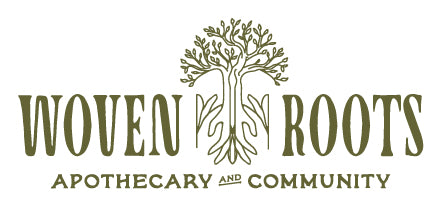A central part of the mission of the Woven Roots Apothecary and Community is to create a practical bridge between self-care and earth-care. For me, there is a depth to this that I haven’t quite figured out how to put words to; the visual that fills my mind as I reflect on this concept is thick, tree-like vines slowly weaving together, combining so completely that they are no longer distinct from one another, until a solid bridge is formed, all along sparkling in the way that lets you know something magical is happening, like you would see in a Disney movie.
And yet, there is something very practical about this concept: I believe that when I am truly connected with and caring for myself, I am more open and receptive to caring for others around me, including other humans, beyond-humans, and the Earth as a whole. Furthermore, when I feel cared for (by myself, others, the Earth), I am more resourced and equipped to reciprocate that care (self-care—> earth-care). From that felt sense of connection, I am more fully aware of my interconnection with everything, the total web of life. I see and experience clearly my interdependence with the planet, how the Earth takes care of me— providing food, water, sunlight, energy, shelter, medicine—and she needs me to take care of her, not only so that she can continue caring for me, but also because she is independently worthy and deserving of care and reverence. My love for the Earth is for her, and it’s for me (earth-care—>self-care). Actually, it’s for all of us. Sickness anywhere is sickness everywhere. Everything is connected. We are all connected.
And working with local and regional plants is going to help heal the Earth and our relationship with her? Well, it’s a start…
Working with local and regional herbs offers numerous ways of caring for the Earth:
- Reduced Carbon Footprint: Regionally and locally grown herbs travel shorter distances to reach consumers, reducing the carbon emissions associated with transportation. This minimizes the herb's carbon footprint, contributing to lower greenhouse gas emissions and combating climate change.
- Conservation of Biodiversity: Local and regional sourcing often includes native and regionally adapted plant species. Promoting these species preserves biodiversity by protecting and promoting plants that are naturally suited to the local environment. This, in turn, supports local wildlife and ecosystems.
- Reduced Packaging Waste: Shorter supply chains in local and regional sourcing often result in less need for excessive packaging. This minimizes packaging waste, which is a significant contributor to environmental pollution.
- Supporting Sustainable Farming: By using local and regional herbs, you bolster local agriculture and the livelihoods of small-scale farmers. This support encourages sustainable farming practices.
Working with regional and local herbs as a form of earth-care also fosters connection by building community resilience and engagement: Supporting local and regional herb growers and herbal product makers contributes to the resilience of communities, as it reduces dependence on global supply chains. It also encourages community by offering opportunities to know the origin of the herbs and the process of growing them, fostering a better relationship with the herbs and the people who grow them.
Connection is often most healed and healing not in the excitement and splash of big, spectacular events, but rather in the cumulation of small, ordinary moments—when we choose to feel our bodies and regard the plants we are taking in as we sip our tea; when we keep our hearts as open as our ears as we connect with community; when we delight in the trees, birds, bees, flowers, rock and rivers not just with our eyes, but with our whole being; and of course, when we choose to care about the impact of where our herbs come from on ourselves and on the planet. So yes, I do believe that choosing to work and be in relationship with local and regional plants matters; and these days, it might not seem like enough, but it’s a start. And it’s a start that can lead to many steps on the journey to weaving self-care and earth-care in our daily lives.
*We just talked mostly about how working with local and regional plants is an important part of earth-care. To consider more about how it also a part of our self-care, read Understanding Our Commitment to Local and Regional, Part 1.
Join the Conversation: When are times you have deliberately choose to buy local and regional products, such as herbs or foods? What differences do you notice when you’ve made those choices? Share your reflections in the comments.

